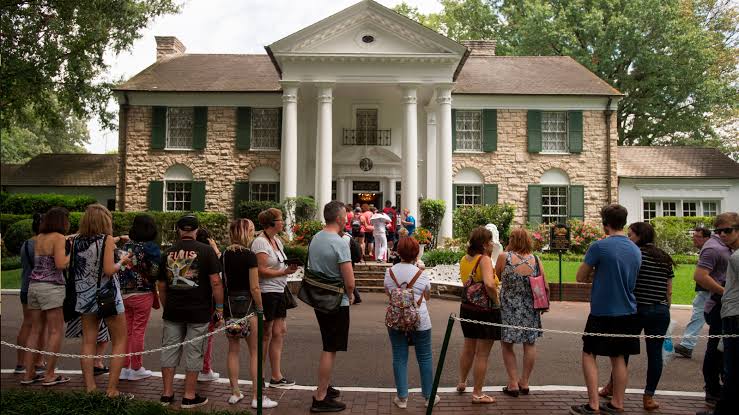Woman who helped save Graceland from possible foreclosure speaks out
Kimberly Philbrick is sharing her side of the Graceland saga for the first time.

At the 11th hour on a Tuesday in May, a Memphis, Tennessee, judge put a halt to the process that could have seen the famous estate of Elvis Presley auctioned off to the highest bidder. The whole episode was surreal and appeared to mark a sad postscript to the death of Lisa Marie Presley, the only child of the King of Rock and Roll, who died 16 months earlier.
“Graceland is a part of this community, well-loved by this community and indeed around the world,” Shelby County Chancellor JoeDae Jenkins said in court. “The loss of the real estate would be considered irreparable harm.”
The judge issued the order after a notary public from Central Florida swore that she had never seen the loan documents that she had been alleged to have notarized and had purportedly been signed by Lisa Marie in her presence. That notary, Kimberly Philbrick, said she could never have imagined what the following days and weeks might look like after her name became intertwined with Elvis’ legacy and his famous home, Graceland.
“Where did they get my name? That’s the million-dollar question,” Philbrick told ABC News in her first comments since the Graceland auction story broke. “I don’t know where they got it. I wish I knew where they got it because then I could tell them, ‘Look, I’m a victim in this. You did this to me too.'”
Philbrick broke her silence last week in an interview with GMA3 anchor Eva Pilgrim.
“My life was uprooted,” Philbrick said. “My identity was stolen, too. That’s what a lot of people seem to forget.”
A former car dealership employee who had also worked in a county office responsible for registering auto-ownership papers, Philbrick wound up in the spotlight when a business entity calling itself Naussany Investments and Private Lending attempted to foreclose on Graceland.
Naussany Investments claimed that Lisa Marie took out a $3.8 million loan before her death and agreed to use the Memphis landmark and tourist attraction as collateral, according to court documents.
On the records submitted to the court, Naussany Investments claimed that Philbrick notarized a promissory note and deed of trust, giving the deal at least the appearance of legitimacy.
“I know for a fact I didn’t notarize anything for her,” Philbrick said of the late Lisa Marie. “I would have remembered it.”
The notarization, according to Naussany Investments’ records in the court filing, took place in Jacksonville, Florida, 90 miles from where Philbrick works as a Daytona Beach drugstore manager.
“The only time I’ve actually been to Jacksonville, I think, is when I pass through it,” Philbrick said. “I have no reason to go there.”
The files included what was purported to have been Philbrick’s official notary stamp and signature.
“It looks absolutely nothing like my signature,” Philbrick explained.
“It’s like they didn’t even attempt to make it look good,” she added. “Everything was fraudulent. Everything was fabricated.”
In May, Naussany Investments sent legal notices to a Memphis newspaper stating that it intended to sell Graceland “at the front of the Shelby County Courthouse” in downtown Memphis on May 23 “to the highest and best bidder for cash.”
Actress Riley Keough, one of Lisa Marie Presley’s daughters, rushed to stop the auction, sending lawyers to court and putting investigators on the case.
That was when, Philbrick said, she found out that her name was tied to Lisa Marie Presley.
‘”Do you know Lisa Marie Presley?’ is what they asked me,” Philbrick said of the investigator who appeared at her workplace one evening. “I thought it was funny.”
She quickly realized that it wasn’t a joke.
Philbrick signed an affidavit, swearing that she never met Lisa Marie Presley and did not notarize anything for her. Keough’s legal team submitted that declaration to the Shelby County Chancery Court as part of a motion for an injunction.
On May 22, Jenkins, the judge assigned to the case, issued an order putting the auction on pause during an eight-minute hearing. He could not have been clearer in pointing to Philbrick’s statement as the key to his decision to issue a temporary injunction.
“The affidavit filed by Kimberly Philbrick raises serious questions regarding the authenticity of the signature on the deed of trust,” Jenkins said.
Philbrick was not in court that day. In fact, she said she rarely leaves the Daytona Beach area except for the occasional trip to Las Vegas.
She figured that the situation involving Graceland was now behind her. But soon, Philbrick’s phone was ringing off the hook, she said, with some of the callers being Elvis Presley fans who were angered by Graceland possibly coming close to being on the auction block.
Philbrick said even her denials didn’t satisfy the callers, and some people figured she must have been involved in the whole thing.
“It was my 15 minutes of hell,” Philbrick said.
Some friends and family contacted her to tell her she was famous.
“I still live in Holly Hill, not Hollywood,” Philbrick said, referring to the name of her Daytona Beach-area community. “Being famous comes with money.”
In June, Tennessee Attorney General Jonathan Skrmetti announced that the probe into Naussany Investments and the attempted sale of Graceland was being turned over to federal authorities. A grand jury is now investigating the matter, looking to see whether wire or mail fraud might have been committed.
Philbrick said she plans to testify at the grand jury on Tuesday after being served with a subpoena by the U.S. Postal Inspection Service.
While in Memphis, she said she plans to visit Graceland because she has never been to the city’s famous estate in the Whitehaven section. Lisa Marie is buried near her late father on the 13.8-acre site.
“I still have to pay $82 to get in, but I saved Graceland,” Philbrick said.
The U.S. Attorney’s Office in Memphis declined to comment about the investigation.
Naussany Investments, which listed its addresses as post offices in Jacksonville and rural Missouri, had working email addresses in May, but messages sent to those accounts bounced back as of Thursday.
The entity originally told the court in filings that their claim to Graceland was legitimate and they would submit additional documents to back that up. No such records have been received by the court.
Philbrick said that despite all she has learned about Graceland over the last three months, she still has no idea how someone found her name and claimed she was the notary associated with this mystery.
“This could have been anybody,’ Philbrick said. “Why me?”



